Updated: January 22, 2026
Written by Dan Simms
Nieves Martinez is a writer and editor at Fixr.com, specializing in home improvement and construction content. With over five years of experience and a Master's degree in Digital Marketing, she collaborates with industry professionals to create clear, carefully reviewed cost guides and renovation resources that help homeowners make informed remodeling decisions.
Learn moreReviewed by Nieves Martinez
The average cost to add a new bathroom in the U.S. is $20,000, and most homeowners pay somewhere between $10,000 and $35,000. The primary cost drivers for a bathroom addition include whether you’re converting existing space or building a home addition, the type of bathroom you’re adding, the bathroom size, and the quality of the materials you choose.
A bathroom addition will boost your home value, but it could be a worthwhile home improvement project even if you’re not planning on selling. An additional bathroom offers more convenience for you and your family, added privacy in the case of an ensuite bathroom, or a comfortable space for guests to call their own temporarily.
Cost to Add a Bathroom


Repurposing Existing Space vs. New Addition
The biggest cost factor when adding a bathroom is whether you convert an existing space or build a new addition. Repurposing a room like a closet, spare bedroom area, or laundry room is generally more affordable since it avoids major structural work, though you’ll still need to add plumbing and electrical lines.
Building a new bump-out or dormer gives you more space and flexibility in design, but it’s much more expensive because it requires structural changes such as pouring a foundation or altering load-bearing walls.
Project | Cost per Sq. Ft. |
Repurpose Existing Space | $200 – $250 |
Build in a New Addition | $400 – $550 |
If you’re building a home addition to house your new bathroom, keep in mind that your local building department likely has setback restrictions that prevent you from building too close to your property lines. Consider these restrictions before planning where your bathroom location will be in your home to avoid unexpected permit denials.
Bathroom Addition Cost by Type
Your project costs will also vary widely based on the type of bathroom you install. A full bathroom is the most common type of bathroom addition. Half baths are less expensive because they’re usually smaller and require fewer materials, but they also don’t include the added expense of a tub. Primary bathrooms are the most expensive because they tend to be the largest and are more likely to have luxury features.
Keep in mind that you should base the type of bathroom you add not only on the total cost but also on the space you have to build your new bathroom and the utility you’re hoping to get from it.
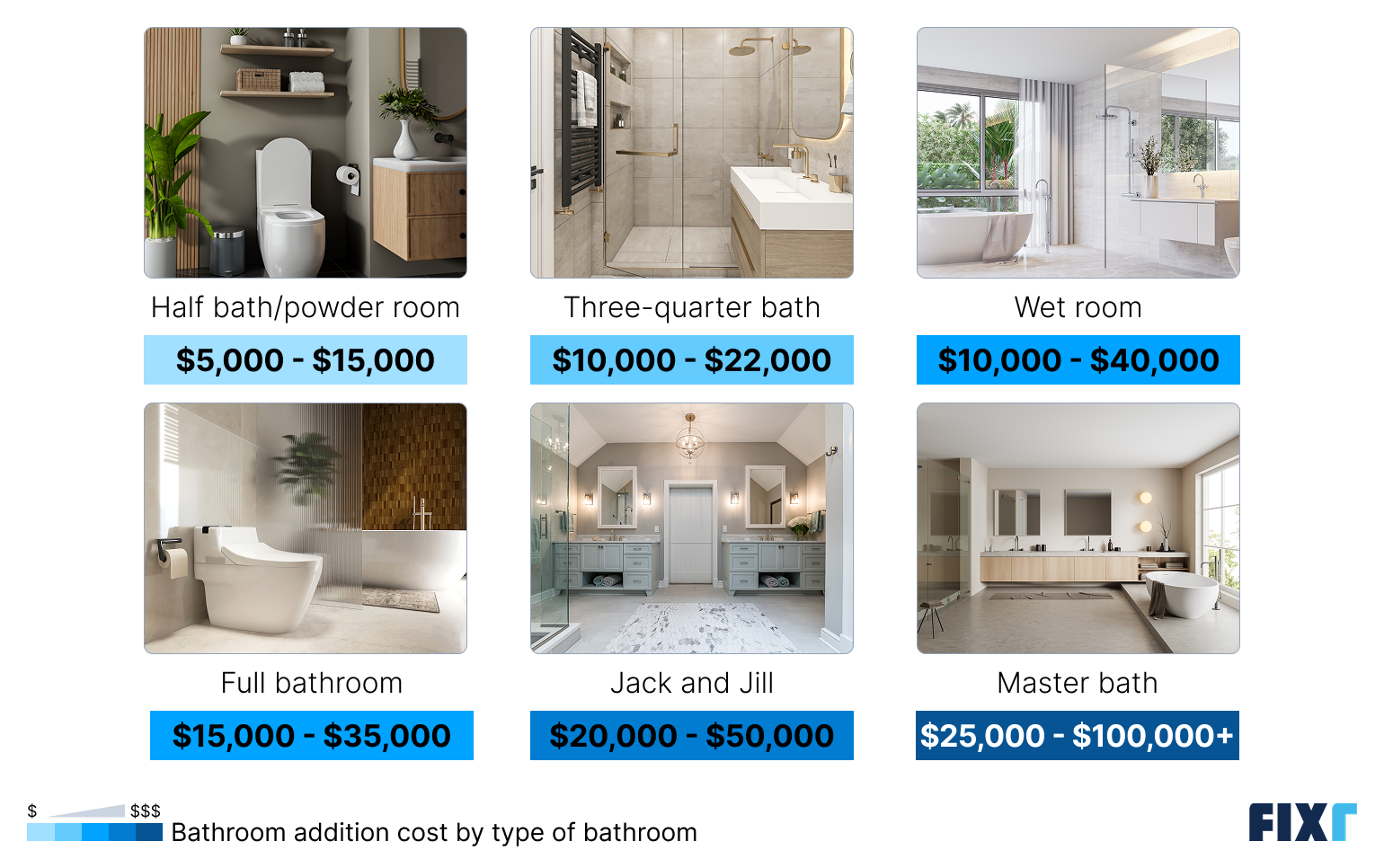
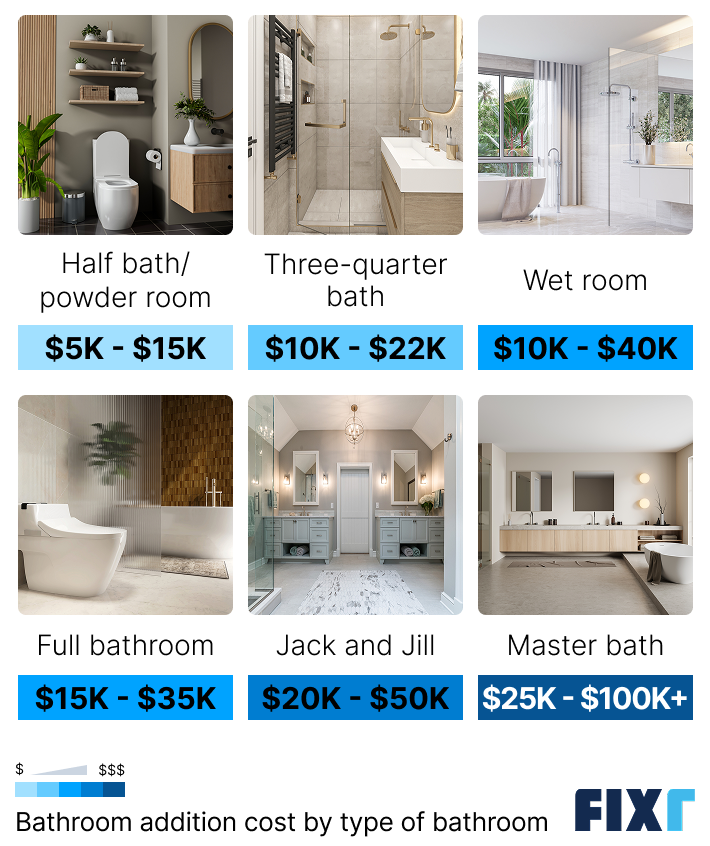
Type of Bathroom | Average Cost Range |
Half bathroom/powder room | $5,000 – $15,000 |
Three-quarter bathroom | $10,000 – $22,000 |
Wet room | $10,000 – $40,000 |
Full bathroom | $15,000 – $35,000 |
Jack and Jill bathroom | $20,000 – $50,000 |
Primary bathroom | $25,000 – $100,000+ |
Half Bathroom or Powder Room
The cost to add a half bathroom ranges from $5,000 to $15,000. A half bath, also called a powder room, includes a sink and a toilet, so it offers far less functionality than a three-quarter or full bath that has a tub, a shower, or both. However, it’s also the most affordable option. A half bathroom might be ideal for you if you have limited space or don’t need the option for bathing.
Three-Quarter Bathroom
A three-quarter bathroom is one step up from a half bath, as it includes a sink and a toilet but also provides a stand-up shower for bathing. This option takes up less space than a full bathroom that also has a tub, so it’s best if you have limited space but want greater functionality than a half bath provides. Adding a three-quarter bathroom to your home will cost between $10,000 and $22,000.
Wet Room
The term “wet room” can refer to a few different types of bathrooms, usually ranging from a half bath up to a full bath in terms of components. The main difference is that a wet room is fully waterproofed. That means your entire floor and usually your walls are tiled, and you can have an open-concept shower that doesn’t require doors, curtains, or even edges. Adding a wet room costs between $10,000 and $40,000.
Full Bathroom
A full bathroom is the most common type of bathroom, so it’s the one most homeowners opt for when adding a bathroom. Full bathrooms include a toilet, a sink, and either a standalone tub or a tub/shower combo. The added tub component drives up the overall cost, as does the fact that a full bathroom is almost always larger than a three-quarter or half bath. Adding a full bathroom costs between $15,000 and $35,000.
Jack and Jill Bathroom
A Jack and Jill bathroom is one that’s shared between two rooms, giving both access to an ensuite bathroom. It has two entry points, and while a second door won’t add much to your installation costs, it does mean you need more space to leave room for in-swing doors. Additionally, some Jack and Jill bathrooms have double features for greater functionality for both bedrooms, so they cost between $20,000 and $50,000 to install.
Primary Bathroom
A primary bathroom, also called a master bathroom, will usually be the most expensive to add, totaling between $25,000 and $100,000. Primary bathrooms tend to be the largest, so the square footage will drive up your costs. Many homeowners also choose more expensive materials and upscale features for primary bathrooms, as they’re intended to be luxurious. Master bathroom addition costs will be highest if you build a home addition to house the new space.
Bathroom Addition Cost per Square Foot
A bathroom addition costs between $200 and $250 per square foot if you’re converting existing space to a bathroom, and prices rise up to $400 to $550 per square foot if you’re building a home addition to house your bathroom.
Bigger bathrooms usually cost more because you’ll need additional materials, from larger fixtures to more tiling to cover the floor and walls. Most bathroom contractors won’t charge solely based on size, as material quality, layout, and utility upgrades and changes also matter, but using your desired bathroom size is a good place to start to get an accurate price.
Square Footage | Conversion Cost | Addition Cost |
35 (5x7) | $7,000 – $8,750 | $14,000 – $17,500 |
40 (5x8) | $8,000 – $10,000 | $16,000 – $22,000 |
50 (5x10) | $10,000 – $12,500 | $20,000 – $27,500 |
60 (6x10) | $12,000 – $15,000 | $24,000 – $33,000 |
100 (10x10) | $20,000 – $25,000 | $40,000 – $55,000 |
200 (20x10) | $40,000 – $50,000 | $80,000 – $110,000 |
Average Cost to Add a Bathroom to a House by Location
Bathroom addition costs mostly vary based on the size of the bathroom, the bathroom type, and whether you’re converting an existing space or constructing a new one. However, if you’re converting existing space to a bathroom, the location can make a difference.
Bathroom additions in tight spaces, like closets, will be smaller and will fit fewer components, so they’ll be more expensive. Some options, like laundry rooms, will already have plumbing routed to them, so you’ll need fewer changes to utilities to accommodate your new bathroom.
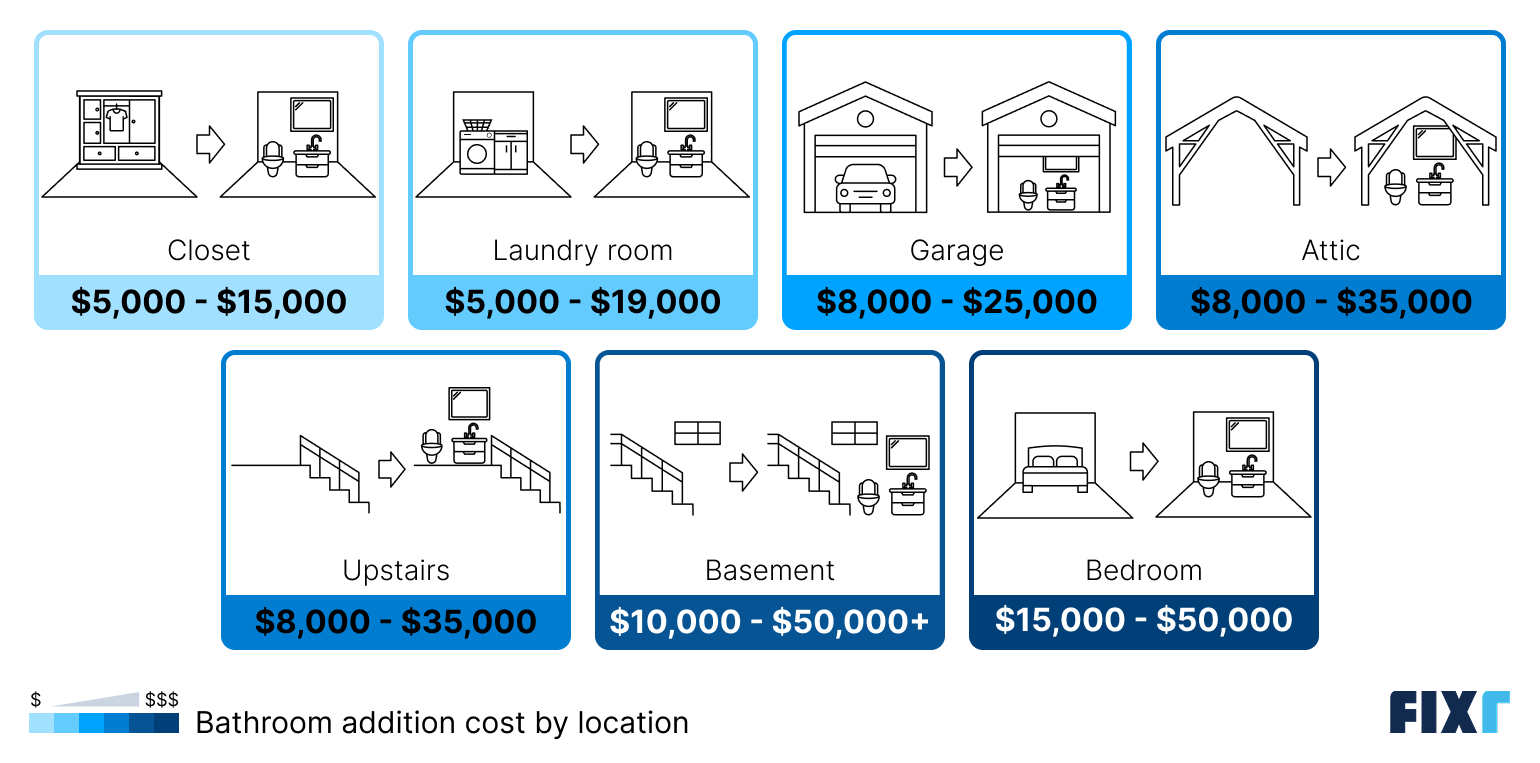
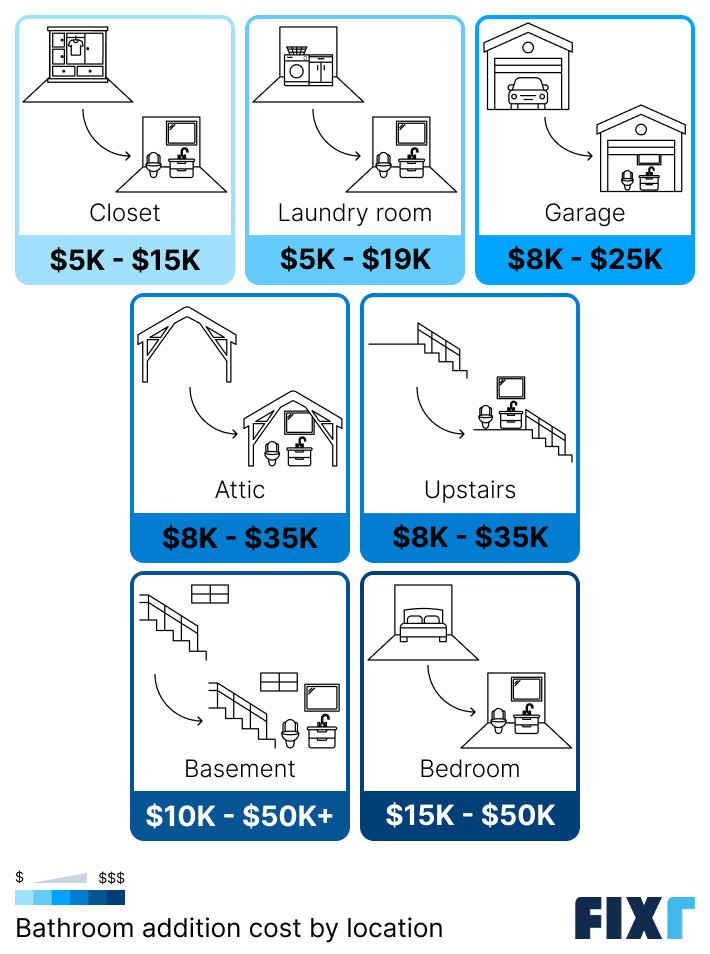
Location | Bathroom Addition Cost |
Closet | $5,000 – $15,000 |
Laundry room | $5,000 – $19,000 |
Garage | $8,000 – $25,000 |
Attic | $8,000 – $35,000 |
Upstairs | $8,000 – $35,000 |
Basement | $10,000 – $50,000+ |
Bedroom | $15,000 – $50,000 |
Closet Conversion
Converting a closet to a bathroom costs between $5,000 and $15,000, in most cases. Closets are small and usually only provide enough room for a small half-bath or powder room. Your costs will include routing water, waste, and electrical lines to the space, but the small area helps keep costs down.
Laundry Room Conversion
Converting a laundry room to a bathroom costs between $5,000 and $19,000. Laundry rooms are also on the small side and typically have room for a half or three-quarter bathroom, but some may accommodate small full baths. You’ll save a bit of money on the installation since your laundry room will already have plumbing and waste lines installed.
Garage Conversion
Converting garage space to a bathroom can cost anywhere from $8,000 to $25,000. Garages give you room for just about any type of bathroom you want, as well as oversized bathrooms that can push your costs higher. Conversion will usually require routing plumbing and waste lines unless you have a utility sink installed already.
Attic Conversion
Adding a bathroom in an attic costs between $8,000 and $35,000. Attics often have space for larger full bathrooms and rarely have plumbing and waste lines nearby, both of which drive up average costs. Maneuvering materials up into an attic can also take longer and push labor costs higher. Expect to spend a bit more for demolition if your attic is already finished.
Upstairs Bathroom
The cost of adding a bathroom upstairs ranges between $8,000 and $35,000, depending on what type of second-floor room you’re converting. Costs will be lower for smaller bathrooms that you’re installing where you previously had plumbing connections, like a laundry room. Prices can climb over $50,000 if you’re installing an ensuite bathroom as an addition to your master bedroom.
Basement Conversion
The cost to add a bathroom in a basement ranges between $10,000 and $60,000. It’s relatively easy to build partitioning walls in a basement, although costs can inflate if your basement is currently finished and you first need demolition. Prices tend to be higher for basement bathrooms than other conversions because it’s more challenging to route plumbing lines through your foundation, and you’ll also need a sump pump to move waste against gravity.
Bedroom Conversion
Partitioning off part of a bedroom to add a bathroom will cost between $15,000 and $50,000, in most cases. Average costs are higher because bathrooms rarely have utility connections, and homeowners tend to install primary bathrooms if they’re giving up part of their bedroom. Primary bathrooms are larger and usually feature more luxurious materials that cost more.
Cost Breakdown of a Bathroom Addition
The cost to build a bathroom addition also comes down to what you install in the new space and the quality of the materials you choose for each portion of the room. Understanding where your money goes during a bathroom addition project and how the cost of each line item can vary based on your preferences can help you get a better idea of how much your specific project will cost. It can also help you adjust your budget to make room for those must-haves and luxuries.
You can use the table below to get an idea of the typical cost ranges for different parts of a bathroom addition. Keep in mind that these can vary based on the size of your bathroom, the layout, material choices, and more.
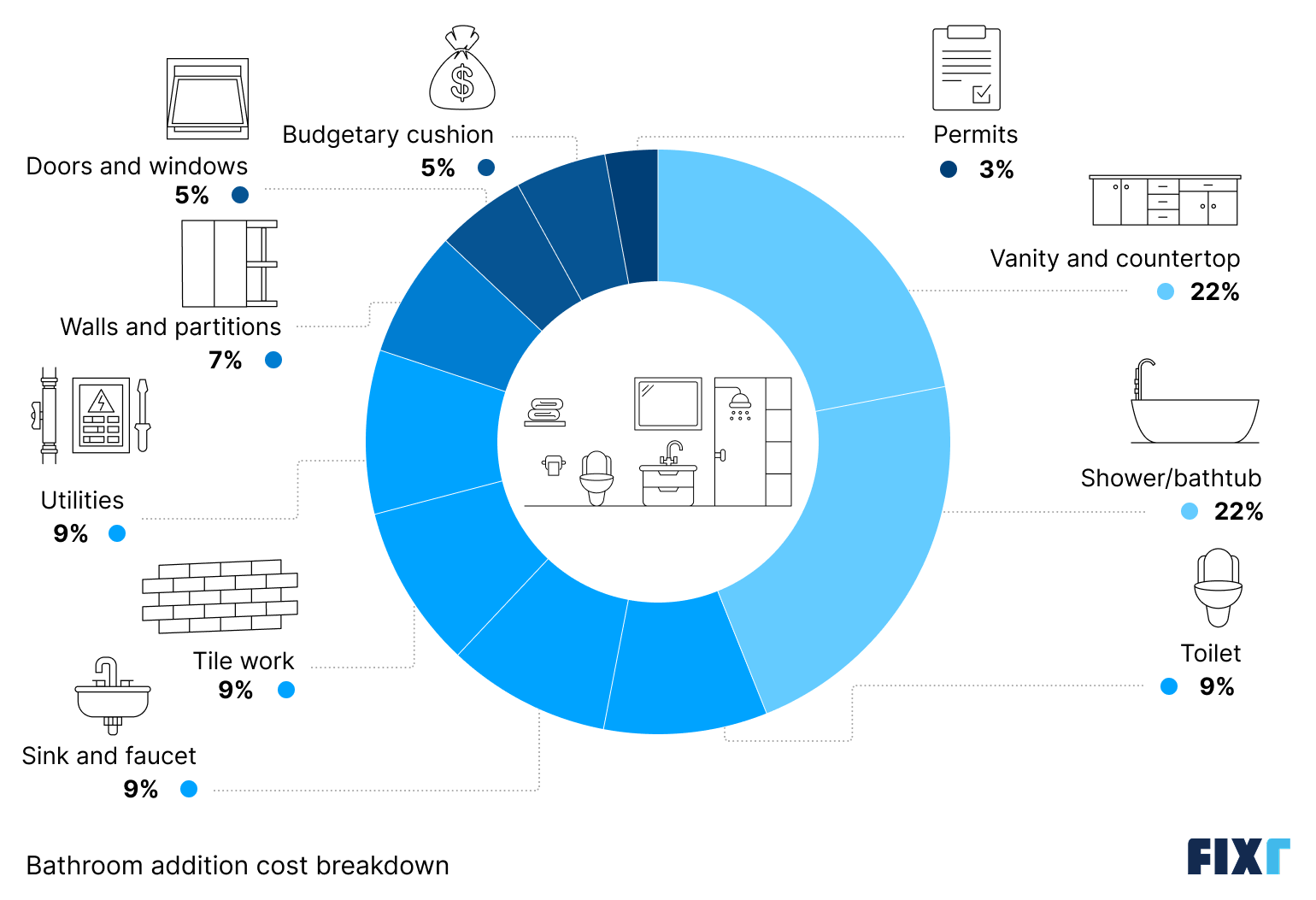

Cost Factor | Percentage of Total |
Shower/bathtub | 22% |
Vanity and countertop | 22% |
Toilet | 9% |
Sink and faucet | 9% |
Tile work | 9% |
Utilities | 9% |
Walls and partitions | 7% |
Doors and windows | 5% |
Budgetary cushion | 5% |
Permits and inspections | 3% |
Shower/Bathtub
Installing a shower/tub combo or a standalone tub will cost an average of between $1,500 and $4,500, but this price could come down quite a bit if you’re adding a three-quarter bathroom with a more affordable stall shower. You could see much higher costs if you’re opting for custom tilework or a walk-in shower.
Vanity and Countertop
Your new vanity and countertop will also cost an average of between $1,500 and $4,500. Your costs will vary based on the size of the vanity you choose and the materials. High-end countertop materials like marble will drive costs significantly higher, while budget-friendly options like acrylic or travertine can help keep costs low.
Toilet
Toilet installation accounts for an average of between $250 and $800. Prices can vary based on the materials you choose. Your costs can climb if your project requires major plumbing work, or if you choose high-end features such as a smart toilet.
Sink and Faucets
Some vanities come with a sink, but if yours doesn’t, expect to pay somewhere between $200 to $700 for the sink, the faucet, and other fixtures, like the tub filler and shower head. High-end materials like brass or copper will push costs higher, but you could get away with just a few hundred dollars if you go with the most affordable materials.
Tile Work
Tile work will add between $600 and $1,800 to your total, on average. Tile is the most common bathroom floor material, so most homeowners will be paying for tilework at least on the floor. This cost also includes tile work for your backsplash and some custom tile work around your shower. Prices can climb much higher if you choose to tile your walls, especially if you go floor to ceiling.
Utilities
When adding a bathroom, chances are you’re starting from scratch in terms of utilities. You’ll need a plumber to rough in water and waste lines for your toilet, shower, and sink, and you’ll need an electrician to add wiring for electrical fixtures and a bathroom fan. Costs can climb higher when more fixtures are moved, the space has additional water features and lighting, or if the new bathroom isn’t near existing plumbing and electrical lines that professionals can tie into.
Walls and Partitions
A big part of adding a bathroom is building walls around the new room for privacy and structure, and this will account for around 7% of your total. This is a good rough estimate if you’re converting an existing interior space to a bathroom. If you’re building a new add-on, you can expect to double your total to account for the foundation, load-bearing walls, roofing, siding, and finishes.
Door and Windows
Expect to pay an average of between $240 and $720 for your bathroom door and a single window in your new bathroom. If you need to resize an existing window or install one where there wasn’t one previously, this cost will go up. Additionally, this line item for a Jack and Jill bathroom will increase since you’ll need two doors.
Budgetary Cushion
Adding a bathroom is a complicated and involved project, so having a cushion built into your budget that will compensate for unexpected costs and change orders is wise. It’s a good idea to set aside around 5% of your total as a cushion.
Permits and Inspections
Adding a bathroom requires permits and inspections to ensure the construction is legal. In most municipalities, you can get a general renovation, remodel, or construction permit to cover everything, while in others, you’ll also need standalone plumbing and electrical permits. In either case, expect to spend an average of $500 on permits. If you’re building an add-on to house your new bathroom, permit costs could climb up to about $2,000.
Labor Costs
Adding a bathroom is a time- and labor-intensive job, and labor will account for an average of 50% of your total. Building a bathroom addition requires many professionals, including plumbers and electricians. You may also need carpenters, tile installers, and more. The table below shows the typical rates of different professionals to help you estimate labor costs.
Professional | Rate |
General contractor | $50 – $150/hour |
Interior designer | $50 – $450/hour |
Electrician | $70 – $130/hour |
Carpenter | $75 – $125/hour |
Plumber | $75 – $150/hour |
Drywall installer | $1.50 – $3.50/sq.ft. |
Painter | $2 – $7/sq.ft. |
Tile installer | $8 – $14/sq.ft. |
Additional Factors Affecting the Final Cost
Bathroom type and size, and whether you’re building a new space for your bathroom will play the biggest roles in your costs. Other factors can also raise your total, so consider all of them to avoid unexpected estimates from your remodel professionals.
Structural changes
Even if you’re not building a home addition to house your new bathroom, you might need structural changes to accommodate a bathtub. Since a filled bathtub weighs hundreds of pounds, you may need structural reinforcement to support that weight, especially if you’re adding a bathroom on the second floor.
Foundation
The type of foundation you have can make a difference in your total, especially if you’re building on the first floor. The cost to add a bathroom on a concrete slab, for example, is higher than installing one over a basement or crawlspace because your plumber will need to route utility lines through the concrete.
Plumbing complexity
Roughing in plumbing for your bathroom can get expensive if you don’t have nearby lines that your plumber can tie into. In some cases, you’ll need a new vent stack and an entirely new waste line running to your main, which can mean paying much more for the utilities portion of your project.
Electrical upgrades
Electrical upgrades might be necessary. Check with a professional to see if your system can handle the added load or if you’ll need an upgraded service or subpanel. Most homes with 200-amp service won’t need major updates unless you’re adding high-demand features like a jetted tub or point-of-use water heater.
Quality of materials
The quality of the materials you choose for your bathroom addition can swing prices by tens of thousands of dollars. Splurging on luxury materials like custom tile work, marble countertops, and high-end toilets and faucets could double your total.
Geographical location
Where you live will have an effect on bathroom addition costs, too, as labor fees usually scale with the local cost of living. Adding a bathroom will cost more in and around major metropolitan areas or in states with a high cost of living.
Aging in place
Think about your future plans for your home and how long you intend to live there. If it’s your forever home, consider upgrading to materials that will make aging in place more comfortable, like non-slip flooring, a walk-in tub, or built-in seating in your shower.
Bathroom Addition ROI
Adding a bathroom to your home can be a great investment, not only for your daily convenience but also for increasing your property's value. According to this year’s Cost vs. Value report, the average return on investment (ROI) for a midrange bathroom addition is around 53%, which is up 18% from 2024. Not only does an additional bathroom mean a major bump in home value, but it also means more convenient living for you and your family before you sell.
It’s important to note that the financial return you’ll see from adding a bathroom depends on several factors, including the type of bathroom, the quality of finishes, and the local real estate market. It also depends on your existing home. For instance, adding a second bathroom to a single-bath home can significantly boost its market appeal.
Ultimately, adding a new bathroom is a major project that requires careful planning, but it's a great way to improve your home's function and value.
How to Save Money on Your Bathroom Addition
While a bathroom addition is always going to be an expensive project and a significant investment, there are ways to keep your costs low and stay within your budget.
Choose your layout carefully: The most expensive part of a bathroom addition is often moving plumbing and electrical lines. By placing new fixtures close to existing plumbing, you can save a significant amount on labor and materials.
Pick affordable materials: Choosing less expensive materials is one of the easiest ways to reduce costs. There is a wide range of affordable yet stylish options for everything from tile to faucets.
Do your own demolition: If you're comfortable with the work, you can save money by tearing out old cabinets, walls, or flooring in your existing home to make space for the new bathroom. However, it's best to leave complex tasks to professionals..
Get multiple estimates: Always get at least three quotes from local contractors for your bathroom addition. Since adding a bathroom is such a complex project, having three estimates allows you to compare prices and ensure you're getting a fair and competitive rate.
Convert existing space over building new: One of the easiest ways to save money on a bathroom addition is to convert existing interior space over building a home addition to house your new bathroom. If you have the room to spare, this can instantly cut your total in half.
DIY vs. Hiring a Professional
A bathroom addition is a complex project that involves plumbing, electrical, and structural work, all of which require specialized skills and must meet local building codes. For these reasons, you should always hire a professional to tackle your bathroom remodel or addition. While a DIY approach might save you money on labor costs, it comes with significant risks that could end up costing you more in the long run.
Mistakes in plumbing or electrical work can lead to costly water damage, electrical fires, and code violations. A professional can ensure the job is done correctly and efficiently, saving you time and potential headaches down the road. They also have the experience and tools to handle any unexpected issues, which can turn an ambitious DIY project into a financial and time-consuming nightmare.
You can save a bit on your bathroom addition by handling small finishing tasks yourself, like painting, sealing grout, or installing cabinet hardware. Just make sure the major work, plumbing, electrical, and structural, stays in the hands of professionals to keep your bathroom safe, functional, and built to last.
FAQs
A bathroom addition costs an average of $20,000, and most projects total somewhere between $10,000 and $35,000. You could pay as little as $5,000 to convert an existing laundry room to a small powder room, and prices can climb as high as $100,000 if you’re building a home addition to house an oversized primary bathroom with luxury bathroom features and high-end materials.
The average cost of a bathroom addition for a small bathroom ranges from $7,000 to $10,000 for a 35- to 40-square-foot bathroom if you’re converting existing interior space. If you’re building a home addition to house your small bathroom, expect costs to fall somewhere between $14,000 and $22,000.
The cheapest way to add a bathroom to your home is to convert an existing space that already has utility connections, like a laundry room. You’ll likely still need some changes to water supply lines and waste lines, but having the connections nearby helps keep costs low. You can also save money by choosing mid-grade materials and opting for a powder room or three-quarter bath over a full bath.
Yes, you can add a bathroom to an existing home to improve functionality and convenience. You have two options for doing so. The first is to convert existing space in your home to a new bathroom, which is the more affordable way to go, especially if you’re converting something like a laundry room that already has utility connections. The second option is to build a home addition to house your new bathroom, which costs about twice as much but gives you more freedom and doesn’t take away from your existing space.
Yes, adding a bathroom will usually increase home value. The project comes with an average return on investment (ROI) of 53%. You’ll usually see a higher value bump from a home addition that houses a new bathroom.
The largest individual cost categories in a bathroom addition are the shower or bathtub and the vanity/countertop, each typically making up around 22% of the total project cost. This means plumbing fixtures and bathroom installation materials—especially showers, tubs, and vanities—tend to be the most expensive line items in a bathroom addition.
Dan was a property manager from 2015 to 2020, during which time he managed and oversaw the upkeep and repairs of over 2,000 residential properties. He uses that experience, as well as his extensive DIY knowledge, to bring reliable information to homeowners about renovations and home-related projects. Since 2020, he has been using his experience to write about home improvement, and his work has appeared on sites like USA Today, CNN, Angi, and Today’s Homeowner.
